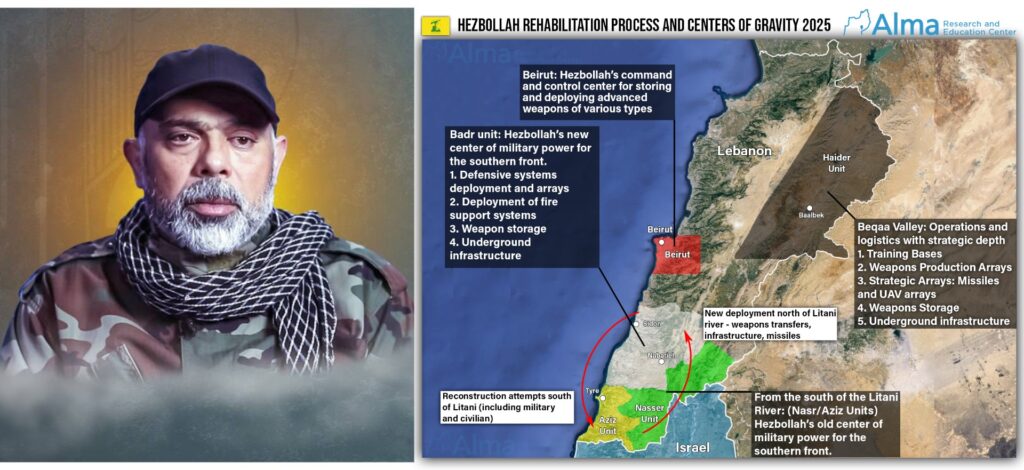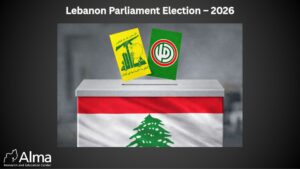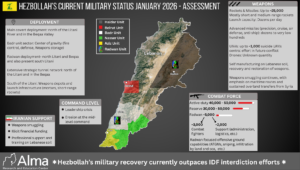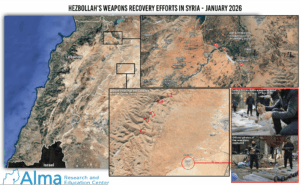The elimination of Haitham Ali Tabatabai (Abu Ali Tabatabai), Hezbollah’s Chief of Staff, on 23 November 2025, constitutes an Israeli escalation regarding its actions against Hezbollah’s reconstruction processes.
Tabatabai served as Hezbollah’s principal military authority and held the most comprehensive military experience within the organization. By virtue of his role, he was responsible for all military reconstruction activity. He was considered part of the organization’s founding generation and was regarded at the level of Fuad Shukr (the former Chief of Staff), Ibrahim Aqil (Head of Operations), and Ali Karaki (Commander of the Southern Front), who were eliminated in the second half of 2024.
The feeling of intelligence penetration within Hezbollah delays, and sometimes even paralyses, operational activity causing a loss of self-confidence. There is no doubt that this feeling continues as a result of the ongoing eliminations carried out almost daily by Israel, a feeling that will persist following Tabatabai’s elimination.
However, the core of Hezbollah’s ideology is the “armed resistance” – this is an identity that cannot be relinquished. Hezbollah is driven by honour, pride, and a deep belief in armed struggle against Israel.
The armed resistance – it is not a means, but an identity. Therefore, reconstruction processes are not merely an operational need, but first and foremost stem from Hezbollah’s fundamental identity. The rifle on Hezbollah’s flag is not ornamental; it is a declaration.
Will the eliminations and strikes, harsh as they may be, stop Hezbollah’s activity? Will Hezbollah truly disarm and “abandon” the “reconstruction” of the Kalashnikov on its flag? Will it renounce the “resistance” and the reconstruction of its military systems?
The answer to this is no.
Israel strikes Hezbollah hard but does not crush it. Israel is in a prolonged struggle against a deeply ideological, patient, and at times sophisticated enemy, strategically backed by the Iranians both operationally and ideologically.
Despite public statements about their supposed “efforts,” the Lebanese state and the Lebanese Armed Forces are unable, (and at times unwilling), to disarm Hezbollah. As long as Hezbollah refuses to cooperate with such an initiative, and by now it should be clear to everyone that it will not! the disarmament simply will not occur…
Therefore, Israel should forgo the notion of offering the Lebanese state or its army further “opportunities” to disarm Hezbollah. Instead, it must establish and pursue a long-term strategy focused on systematically weakening Hezbollah, while rallying support from the United States, select European countries (France, unfortunately, can be excluded in advance in this context…), and certain members of the moderate Sunni bloc in the Middle East — and potentially even the country bordering Lebanon to the east.
How long must this policy continue? Apparently forever…
Israel’s weakening policy against Hezbollah must be carried out across “the entire field” in Lebanon, that is: every geographic area in Lebanon, and every target and figure directly or indirectly connected to Hezbollah (military, semi-military, and “civilian”), is a legitimate object for attack at any given time from now and indefinitely.
Such a policy can significantly weaken Hezbollah and keep it a weak organization, but it will not destroy it completely.
Israel must recognize this reality and be prepared for repeated future confrontations with Hezbollah. The question is not whether these confrontations will occur, but when they will occur.
The internal debate within Hezbollah — whether to respond to Israeli attacks during the ceasefire or refrain from responding — did not begin with the elimination of Tabatabai on November 23, but has existed for a long time.
The concept of “strategic patience” has traditionally been associated with Hezbollah, reflecting its willingness to absorb Israeli actions without responding since the ceasefire of 27 November 2024. Yet from this point forward, the term increasingly applies to Israel as well, as its strategy of weakening Hezbollah, which requires strategic patience and perseverance for an indefinite period of time.
In the postwar period, the new competition between Israel and Hezbollah had only just begun: a policy of strategic weakening versus ideological rehabilitation.







4 Responses
Two points.
It clear that Hezbollah is not responding not beacuse “strategic patience,” rather my assessment is they simply cannot. Proof of this is how Hezbollah fully remained silent during the Israel-Iran war.
Secondly, the article fails to ponder as to what would happen in the event that the Iranian regime falls. Would Hezbollah disarm then? is it more probable?
Dear Tal,
I do not accept the idea that hezbollah will remain in Lebanon. We must be determined to destroy the existance of their cancerous governmental destabilization to secure a lasting peace with our northern neighbor. It is also our duty to liberate Lebanon from terrorist oppression. The death chants, hezbollah and all the ring of fire terrorists have made against Israel and the USA, must now be executed upon their own heads. The Almighty One will destroy those who destroy the earth. Let us align with God and fulfill our role to defeat these evil enemies unto Total Victory!!!
Israel will fall apart before you can do that. Go bring back your people to the north if you can first of all lol
Unfortunately, Levantine Arab culture at large has ever been, is currently, and probably will ever be unable to express any collective political will or vision apart from the urge to destroy Israel. Israel is obliged to accept this reality and do what she must to protect her citizens. While it is gratifying to fantasize about Syria, Iraq, and Jordan surmounting the fruitless and self-defeating national purpose of defeating Israel, Lebanon has conclusively proven that it cannot, and will continue banging its head against the Israeli wall. For it’s part, Israel would rather open the door to its neighbor.